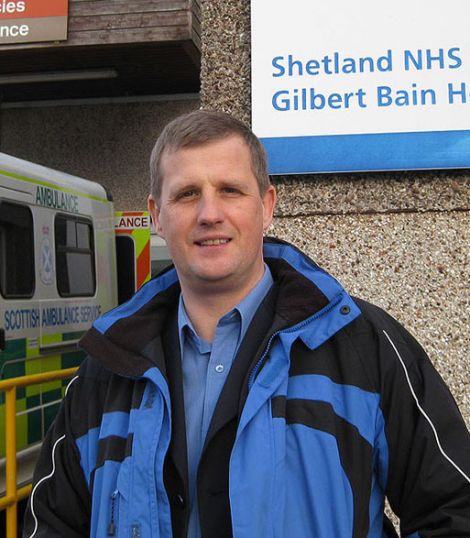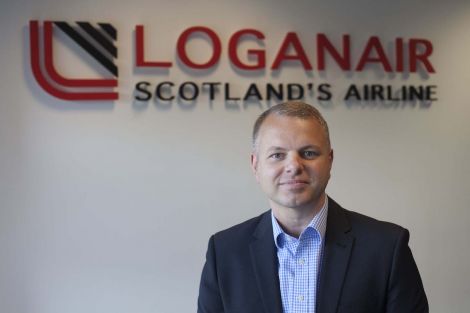News / NHS patients to travel to Aberdeen by ferry
PATIENTS from Shetland who have to travel to Aberdeen for medical treatment and appointments are to be sent on an overnight ferry rather than an hour-long plane journey in a contentious move that could save the isles’ health board as much as £1 million a year.
NHS Shetland’s board decided on Tuesday – by a margin of six votes to four – to offer passages by ferry unless there is a specific clinical reason meaning patients must travel by air.
A one-year trial beginning on 1 April was agreed following a review of current arrangements, with the health board expected to spend around £2.71 million in the 2016/17 financial year on patient travel – equating to six per cent of its core budget – under a setup where patients travel primarily by air.
The decision drew immediate criticisim, with Shetland MSP Tavish Scott saying he is “very concerned” at the impact it will have on patients, SIC leader Gary Robinson describing it as “folly” and Loganair describing it as “very disappointing”.
Robinson said: “While I accept that NHS Shetland has difficulties in balancing its books, sending hospital patients on what could be up to a 38-hour round trip to Aberdeen by ferry, perhaps more if delayed by bad weather, is just wrong.
“While I accept that accommodation will be made for the most frail to travel by air this decision heaps more pressure on medical practicioners to decide who is eligible for air travel and who is not.”
Those travelling by ferry will be given a cabin, and when patients require an escort they will be able to share the cabin. If a patient wishes to take a friend or family member with them, they will be able to share the patient’s cabin while only paying a walk-on fare.
If patients still wish to travel by air they can claim back a portion of their fare up to the value of the ferry journey the NHS would otherwise have paid for.
Become a member of Shetland News
Patients travelling to attend appointments in Edinburgh, Glasgow, Inverness or specialist centres in England will not be affected by the changes and will continue to fly.
Those not expected to take the ferry will include children, pregnant women in their third trimester and patients travelling for cancer treatments such as chemotherapy.
On any occasions where no cabins are available on the boat then NHS Shetland will pay for patients to travel by air.
NHS Shetland said that so far in 2016/17 it has supported over 600 patients to have local appointments that would otherwise have been provided on the Scottish mainland, using arrangements such as video conferencing clinics.
Health board chief executive Ralph Roberts said: “While this decision has been difficult, it reflects the commitment of the board to take the steps necessary for balancing our budget, while maximising the proportion of that budget we spend directly on clinical care.
“In addition, we will continue to work hard to reduce the need for patients to travel at all by offering more local services, and by alternative approaches to appointments such as video clinics.
“We have ongoing dialogue with colleagues at NHS Grampian regarding patient pathways with the aim of reducing unnecessary patient travel, however we also want to encourage our patients to ask questions about the need for some appointments such as post-operative follow-ups which may well be deliverable in Shetland.
“This is clearly more convenient for patients, but it also allows the money that would have been spent on travel to be better used elsewhere.”
Board member and SIC convener Malcolm Bell opposed the decision for a number of reasons, saying it was important to “treat the cause and not the symptom”.
He agreed too many patients were being sent south, with around two thirds of journeys for outpatient appointments that could often be done over the phone or video link.
But he had concerns about “insisting everybody goes by the boat… an awful lot of people don’t like sailing, get quite ill sailing”.
“What about people who get released from hospital, go on the boat and end up spending 25 hours on the high seas [in bad weather]?” he said.
Bell questioned how allowing people to book their own flight before NHS Shetland partially reimburses them would operate, wondering whether it amounted to ADS (Air Discount Scheme) “by the back door” given the Scottish Government does not allow discounted travel for business use.
Robinson said he had argued with the government that patient travel should be eligible for ADS “but it isn’t, and I’m all the more surprised at the health board chairman’s suggestion that patients could claim it”.
Bell said he favoured the option of looking at the Red Cross providing escort assistance at Sumburgh and Aberdeen airports while working with NHS Grampian to reduce the number of journeys and speaking to Loganair with a view to finding a way to cut the cost of travel.
He added that it could create a twofold headache for Shetland’s lifeline transport – reducing cabin availability on board NorthLink during busy periods and removing around a quarter of Loganair’s Aberdeen passengers, which could potentially result in the airline reducing capacity or raising its prices.
NHS Shetland pointed out that the £1 million savings were roughly the equivalent of the running costs for three of its rural GP practices, the local maternity service, the A&E service or two and a half months’ worth of patients’ medicines.
The health board is seeking to make savings of £4.5 million to balance its budget next year amid a squeeze on public spending and growing demand on services.
But Scott said he was “very concerned by any suggestion that patients would be forced to endure a 12-hour overnight ferry journey compared to a 45-minute flight to Aberdeen”.
“This proposal needs to be very carefully assessed both from patients’ perspective, the impact on Loganair and the impact on public money being used to provide ADS financial assistance for Shetlanders flying south,” he said.
“The NHS cannot act without recognising the wider Shetland perspective.”
Loganair managing director Jonathan Hinkles said it was “very disappointing” that NHS Shetland “has not engaged in the discussions between Loganair and NHS nationally” in relation to a number of proposed initiatives as part of the renewal of the NHS-Loganair contract.
“We are firmly of the view that the one-hour air service to Aberdeen is by far the best means of travel for patients who are able to fly,” he said. “We can only assume that NHS has fully considered the clinical and welfare aspects of patients spending two consecutive nights on the ferry between Lerwick and Aberdeen in reaching this decision.”
He said the “significant extra pressure” on the ADS budget as a result of giving patients the opportunity to book their own travel meant it was “highly unlikely that there will be any cost saving to the public purse once the full implications of NHS Shetland’s actions have worked through the system.
“Nonetheless we welcome the fact that patients have this option open to them, and look forward to welcoming them as individual travellers on Loganair flights where we’ll continue to provide the best possible service and care that we can.”
Hinkles added it was “premature to speculate” on whether it would lead to a reduction in the number of Sumburgh-Aberdeen flights.
“We need to see how the new arrangements will work in practice, and whilst it would be easy to announce a reduction today, it would be an irresponsible knee-jerk reaction for us to do that,” he said. “However, if there is a prolonged downturn in passenger numbers on the route as a result of the NHS changes – or indeed, other factors – then we will adjust our schedules and seat capacity accordingly.”
Become a member of Shetland News
Shetland News is asking its many readers to consider paying for membership to get additional features and services: -
- Remove non-local ads;
- Bookmark posts to read later;
- Exclusive curated weekly newsletter;
- Hide membership messages;
- Comments open for discussion.
If you appreciate what we do and feel strongly about impartial local journalism, then please become a member of Shetland News by either making a single payment, or setting up a monthly, quarterly or yearly subscription.






























































